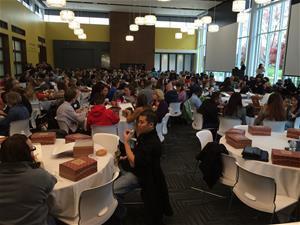More than 400 Educators on Campus for Neuroscience of Education Symposium
Katie Bradley
November 12, 2014
 Educators congregated at Marian University on Saturday, November 8, for the fourth annual Educational Neuroscience Symposium, "The Frontier of Social and Emotional Learning."
Educators congregated at Marian University on Saturday, November 8, for the fourth annual Educational Neuroscience Symposium, "The Frontier of Social and Emotional Learning."
More than 400 participants heard from international experts on the frontier of social and emotional learning, exploring educational neuroscience as a core component for engagement and attention for students.
Educational neuroscience is the core component of engagement and attention, and addresses how educators can allow students to embrace "how" their brains learn and behave. Experts believe that everyday experiences structurally and functionally change the brain, and that behavior management shifts to engagement when instructors teach to a child's unique brain.
"Educational neuroscience lays the foundation for relationships, instruction and assessment in and out of the classroom. The engagement created through these principles stimulates motivation and all children and teachers begin to thrive together. When we employ these principles and strategies we do not add more work into the curriculum; for it is a way of being with students in school," said Lori Desautels, Ph.D., assistant professor of education and organizer of the event.
Speakers included Terry Small, B.Ed., M.A., a master teacher and learning skills specialist; Judy Willis, MD, M.Ed., doctor and author of Research-Based Strategies To Ignite Student Learning: Insights from a Neurologist/Classroom Teacher; and Michael McKnight, M.A., an educational specialist for the New Jersey Department of Education.
In the four years Marian University has hosted the event, the number of attendees has nearly tripled, indicating an increasing interest in educational neuroscience for teachers throughout the state.
Feedback from attendees of Saturday's event was overwhelmingly positive and included, "Thank you for bringing the science to the art of teaching. This symposium brought ideas and strategies of how to emotionally and academically connect to our students in ways that activated all brains, the educators, and the students."


